ISSN : 2471-9838
Nano Research & Applications
Enhancement in the dielectric properties of the PVDF-BTO nanocomposite with the employment of rGO contents
World Congress on Materials Science & Engineering
August 23-25, 2018 Amsterdam, Netherlands
Usman Yaqoon and Hyeon Cheol Kim
University of Ulsan, Republic of Korea
Posters & Accepted Abstracts: Nano Res Appl
DOI: 10.21767/2471-9838-C4-018
Abstract
The effect of reduced graphene oxide (rGO) contents on the dielectric and ferroelectric properties of poly (vinylidene fluoride)-barium titanate (PVDF-BTO) nanocomposites have been investigated. The nanocomposites were obtained by the polymerization of the graphene oxide (GO) into the PVDF matrix to achieve an insulator-conductor-insulator sandwich structure, and BTO was then carefully added to the composite. Four different flexible piezoelectric films were prepared by varying the rGO contents into the PVDF matrix, followed by the drop wise addition of BTO solution. For clarity, the samples were labelled as PB (PVDF-BTO-RGO 0 wt%.), PRB1 (PVDF-BTO-RGO 0.1 wt%.), PRB2 (PVDF-BTO-RGO 0.3 wt%.), and PRB3 (PVDF-BTO-RGO 0.5 wt.%.). Field emission scanning electron microscopy (FESEM) analysis was carried out to check the surface morphology and to observe the uniform distribution of BTO NPs into PVDF matrix. Additionally, X- diffraction (XRD) pattern was taken in order to realize the rGO effect on the crystallinity of the PVDF. It was believed that rGO sheets may attracts the polymer chain and aligning it into one direction due to the free charges on its basal plane. Furthermore, the electrical data for the as-synthesized piezoelectric sheets was also measured. The as prepared optimum nanocomposite (PRB2) sample showed high dielectric constant (98 @ 1MHz) and relatively low loss (0.081 @ 1MHz). Furthermore, the nanocomposite exhibit energy density of 4.5 J/cm3 at an electric field of 50 MV/m, which was calculated from the P-E loop using , where E and P refer to the electric field and polarization, respectively. Considering these results, it was estimated that as-synthesized piezoelectric-ferroelectric material can be a promising building block for its application in energy harvesting and high frequency capacitors.
Biography
E-mail:
usmanyqb3@gmail.com
Google Scholar citation report
Citations : 387
Nano Research & Applications received 387 citations as per Google Scholar report
Nano Research & Applications peer review process verified at publons
Abstracted/Indexed in
- Google Scholar
- China National Knowledge Infrastructure (CNKI)
- Directory of Research Journal Indexing (DRJI)
- WorldCat
- Publons
- Secret Search Engine Labs
- Euro Pub
Open Access Journals
- Aquaculture & Veterinary Science
- Chemistry & Chemical Sciences
- Clinical Sciences
- Engineering
- General Science
- Genetics & Molecular Biology
- Health Care & Nursing
- Immunology & Microbiology
- Materials Science
- Mathematics & Physics
- Medical Sciences
- Neurology & Psychiatry
- Oncology & Cancer Science
- Pharmaceutical Sciences
